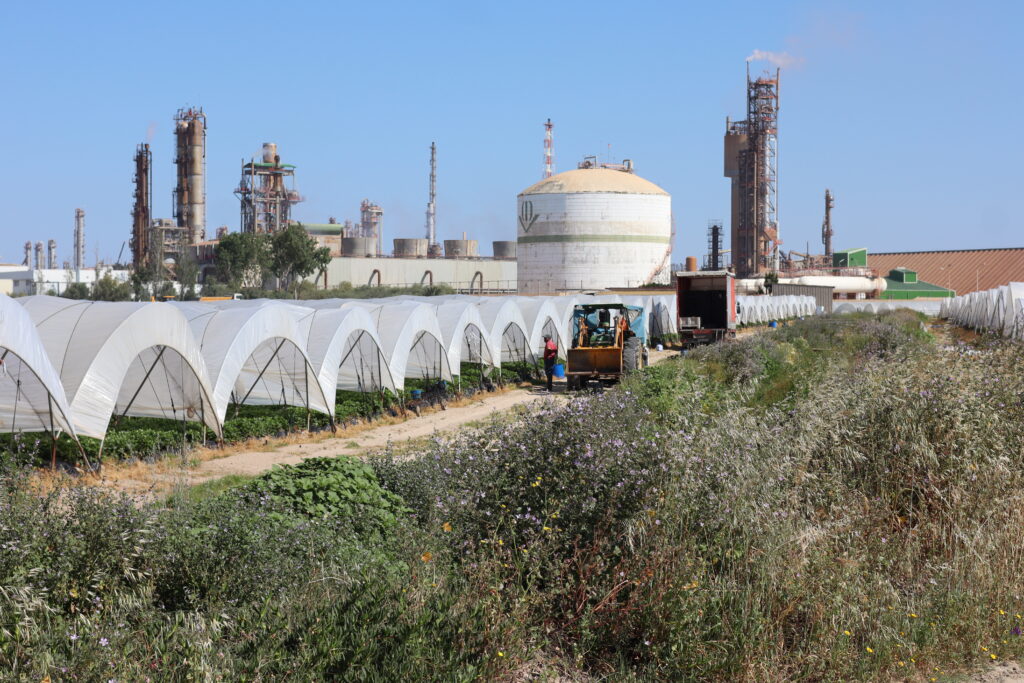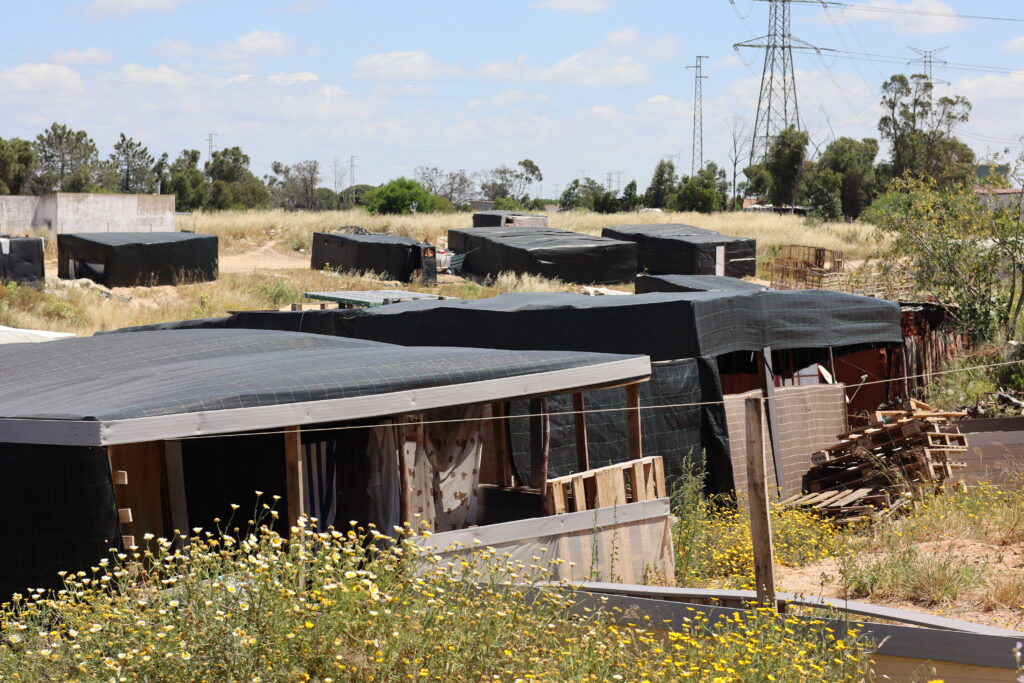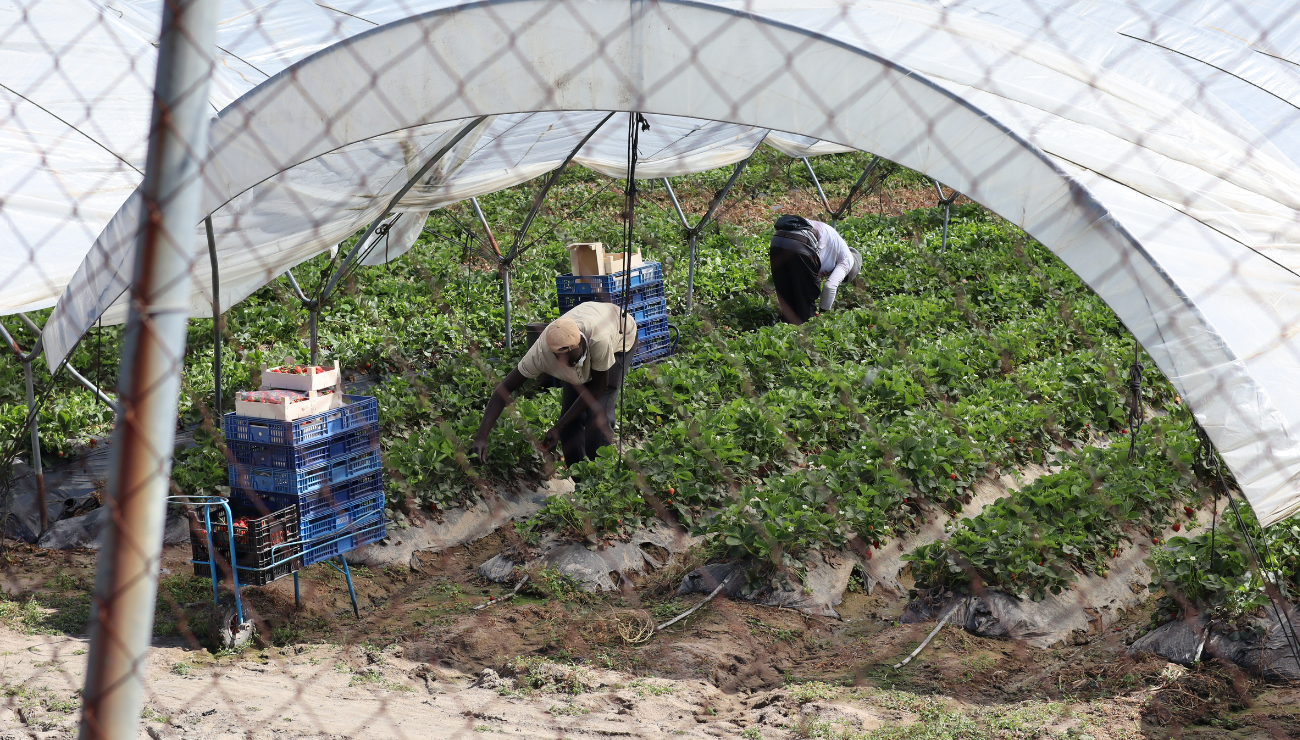This investigation was developed with the support of Journalismfund Europe.
Farm owners convicted of exploiting migrant workers continue to claim millions in taxpayer-funded subsidies, DeSmog can reveal.
A major new investigation traced dozens of EU payments to farms that have breached, are under investigation for, or have already been convicted of labour-related offences.
DeSmog found that 30 farms and farm owners – ranging from smallholdings to large estates – received at least €14 million in subsidies over the past ten years, despite convictions or formal investigations relating to labour abuse. The figure is just a fraction of the likely total, covering cases that faced legal penalties in some of the EU’s largest countries.
With an overall budget of €378.5 billion, the Common Agricultural Policy (CAP) – aimed at supporting EU farmers and improving Europe’s food security – makes up a quarter of the bloc’s seven-year expenditure. But critics say the subsidy is failing the EUs over nine million agricultural workers, of which at least one in four are estimated to be migrants.
Subscribe to our newsletter
Stay up to date with DeSmog news and alerts
Workers shared with DeSmog harrowing accounts of their treatment at the hands of employers, who frequently made false promises of fixed contracts and decent wages.
Instead, “we were treated like slaves, working shifts of up to 14 hours,” recounts Mohammed, a graduate from Morocco who in 2023 worked as a fruit-picker in southern France, where he was subjected to verbal and physical violence, constant surveillance, and forced to live in cramped, dirty conditions.
In stark contrast, Mohammed’s employer was paid over €270,000 in public funds between 2017 and 2024, including €15,000 in 2024 – the year Mohammed and five of the 60 Moroccan workers at the farm filed complaints about their treatment. Following an investigation, the farmer was charged with human trafficking. He is currently awaiting trial.
In another case, a farmer in Jaén, Spain – previously convicted of labour exploitation in 2016 and twice charged with murder over the alleged deaths of two different migrant farmworkers a decade apart – was paid over €118,000 in public funds between 2014 and 2022. The sum includes €17,000 paid in 2022, a year after a second worker, Ibrahima Diouf from Senegal, disappeared following an argument over unpaid wages. The farmer is now awaiting trial for Diouf’s alleged murder.
A new “social conditionality” reform, introduced in full this year, ties subsidies to the treatment of people working in the fields for the first time. But this investigation reveals how the measure – implemented by EU member states – is riddled with issues, ranging from a major lack of transparency to shoddy enforcement.
It comes as the European Commission’s next proposal for CAP – currently under review – risks watering down social conditionality further, or axing the reform entirely.
A Commission spokesperson defended the measure as “an important signal that farm workers should be treated with respect”.
“The vast majority of farmers do treat their workers properly,” they told DeSmog. “Unfortunately, as is the case in any sector, there are exceptions. The social conditionality mechanism is an important signal that farm workers should be treated with respect – with decent conditions and a right to a safe working environment.”
For the EU to be funnelling large sums of public money into farms accused and convicted of labour abuses was “scandalous,” said Olivier De Schutter, co-chair of the International Panel of Experts on Sustainable Food Systems (IPES-Food).
“People want food that is fair – both in how it’s grown and how people are treated – and the Common Agricultural Policy should be a tool to deliver that,” he said.
“Instead, public funds continue to subsidise farms implicated in exploitative food production, including modern-day slavery. Social conditionality was meant to change this, but it has proven toothless – failing to prevent abuse or trigger meaningful sanctions.”

Minimal Fines
A cross-border team of journalists reviewed dozens of court filings, media reports and testimonials, and interviewed precarious workers at farms across Europe.
The nine-month investigation identified over a hundred individual and corporate-owned farms involved in labour violation cases across France, Spain, Germany and Italy, the largest recipients of the CAP subsidy, and cross-checked these with an EU farm subsidy database.
Press and court documents were often heavily edited or inaccessible, and the opaque movement of money through cooperatives and consortia meant it wasn’t always possible to verify whether an offender had received CAP funds. The 30 cases identified by DeSmog are likely to be a conservative estimate, since the vast majority of landowners benefit from the subsidy.
The outcome of these cases varied considerably depending on the country – ranging from convictions to administrative sanctions, financial settlements, and ongoing criminal investigations. In all of them, DeSmog found that CAP funds continued to be paid to farms once prosecutors had opened investigations – and frequently after convictions.
In 2022, a court in Piedmont, northern Italy, sentenced a poultry farmer and his mother to three years in prison and an 8,000 euros fine for exploiting migrant workers. The jail sentence was reduced to 18 months on appeal. Italy’s state police anti-terrorism unit DIGOS found the pair had underpaid wages as part of a tax evasion scheme. The son received more than €90,000 in subsidies the year of his conviction, and €110,000 the following year.
In another case in Campania, southern Italy, a farmer convicted of labour exploitation in 2023 received nearly €200,000 in CAP subsidies the following year – almost enough to cover the €250,265 fine imposed as part of his sentence. The same farm, which collected over a million euros in subsidies since 2015, was found to be paying migrant workers just €4.50 an hour to work 11-hour days, seven days a week.
Similarly in 2024, a farmer and local politician for the centre-right People’s Party in Galicia, Spain, was sentenced, along with two family members, to nine months in prison after forcing two migrant workers to work 13 hours a day – without a contract, breaks or benefits. The three convicted farmers were ordered to pay the workers a total of €44,000 in compensation, but their family-run farm received €41,000 in CAP subsidies that same year. Since their initial arrest, they have been paid €283,000 in EU funds.
In 2023, Spain’s labour inspectorate ruled against Berrynest, a major berry producer in Huelva, for failing to pay overtime to its warehouse workers and for violating legal limits on their shift lengths.
Grassroots workers’ organisation Jornaleras de Huelva en Lucha, which had brought the case, had been denouncing such practices at the company for the previous five years. Yet even after the ruling the berry producer – one of the largest private recipients of CAP funding in the EU – saw its subsidies go from €3.26 million in 2023 to €3.41 million in 2024.
Cases of labour abuse were concentrated but not confined to southern Europe, the investigation found.
In 2021, labour ministries signed an agreement that up to 5,000 Georgians a year could enter Germany legally and work as seasonal workers. In the same year, 18 Georgian strawberry-pickers sued their employers after finding themselves housed in dirty, mouldy accommodation and paid only a fraction of what they’d been promised.
While one case was settled, the second is yet to be resolved. In the years since the lawsuits were brought, the two farmers have collected around €63,000 in CAP funds.
Carlos Ruiz-Ramirez, author of a 2024 Oxfam report on migrant workers’ experiences in Europe, says it is imperative for the EU and national governments to close subsidy loopholes and ramp up labour inspections.
“Workers are being exploited on Europe’s farms,” he told DeSmog, “and EU subsidies are bankrolling this.”

‘Cosmetic Measure’
Widespread labour abuses in Europe’s fields were meant to be addressed through ‘social conditionality’. Under the flagship reform – negotiated in 2021 and implemented across the EU this year – farmers would have to comply with minimum social and labour standards to receive payments, and be fined a percentage of the CAP funding if they did not comply.
France was one of the three member states to voluntarily introduce the reform in January 2023, along with Italy and Austria. However, not a single penalty has yet been imposed by French authorities.
The mechanism is informally set to be reviewed in 2027. But at this point the re-design of the measure for the next CAP period, which runs from 2028 to 2034, will have already been decided.
“There is still absolutely no channel of communication set up between the CAP paying agencies and the labour inspectorate [in France],” explains Lucas Dejeux from the Confédération Générale du Travail (CGT), one of France’s five big trade unions, who said that those authorising CAP payments often aren’t even aware when farmers are convicted for violations.
“We have not received an internal memo on the subject… there is nothing at all,” he adds. Two other labour inspectors, who wished to remain anonymous, corroborated this.
Under the reform, fines for labour abuse are issued as a subsidy cut of up to 10 percent, generally rising to 30 percent for repeat offenders. The penalties are only ever imposed as a one-off reduction on funds from the year of the offence.
In Austria, this has happened just once. A farmer was ordered to pay more than €3,000 for breaching social conditionality on two separate occasions in 2023 and 2024 – docking just four percent off the average 40,000 euros he received annually in CAP subsidies. He was fined three per cent of his CAP payments in 2023, which was increased to five per cent due to the repeated violation.
According to the Spanish ministry of agriculture, 227 beneficiaries of CAP subsidies were penalised under social conditionality in 2024, mostly with a three percent reduction of their funds. The figure is tiny compared to the scale of abuses detected in the sector every year. The latest available figures for 2023 show the labour inspectorate recorded 7,449 labour violations in agriculture.
Yoan Molinero, senior researcher at Comillas University’s centre for migration studies, says even these moderate sanctions will also only be applied against basic direct payments, whereas most funding to the fruit and vegetable sector – where the worst labour abuses take place – is received through other CAP schemes.
Indeed, all of the €3.4 million received in 2024 by the Huelva berry producer would be exempt from sanctions under current rules, since it was paid from a sector-specific aid program.
For Molinero, the cases reviewed by DeSmog cases reflect “the total disconnect between subsidies and social conditions of production.”
In its current form, social conditionality is “less an initial step in the right direction towards protecting workers,” Molinero said, “and more a cosmetic measure designed to offer the semblance of change while maintaining the CAP status quo”. Its impact on offending farmers will be “negligible,” he said.
Éric Sargiacomo, a French social democratic MEP and vice chair of the agriculture committee, agrees. “The level of sanctions are too low to operate as a deterrent,” he told DeSmog.
As the centre-right European People’s Party increasingly aligns itself with far-right forces on agricultural policy, the risk with the next CAP reform is that social conditionality will be weakened further. The Commission’s new proposal – to be introduced in 2028 – would exempt farms under ten hectares from controls and penalties, effectively exempting around 70 percent of farms from sanctions.
“Workers’ rights can’t depend on the size of the farm,” said Cristina Guarda, an Italian Green MEP and farmer. “It’s like saying exploitation is acceptable as long as it happens on a small scale. Being underpaid [as smallscale farmers] doesn’t give us the right to violate others’ rights.”
Guarda’s counter proposal, and that of the European Federation of Food, Agriculture, and Tourism Trade Unions (EFFAT), is to strengthen social conditionality through withholding CAP payments. She explains this would mean any farmer under investigation for serious labour abuses would have their subsidies automatically stopped in advance until the proceedings in the case are fully resolved.
“Farmers with a serious history of labour violations, exploitation, or anti-union practices should not have access to public funds,” Guarda told DeSmog.
“Decent work and good food must be a core goal of EU food policy,” added Olivier De Schutter of IPES-Food. “Yet instead of raising the bar, the Commission’s latest CAP reform proposals risk further weakening social and environmental standards. Europe cannot afford a race to the bottom in its food system.”
Additional reporting by Pascale Müller
Editing by Phoebe Cooke and Clare Carlile
This investigation also appeared in El Salto Diario (Spain), profil (Austria), L’Humanité (France), FragDenStaat (Germany), Taz.die Tageszeitung (Germany) and L’Espresso (Italy).
Subscribe to our newsletter
Stay up to date with DeSmog news and alerts






